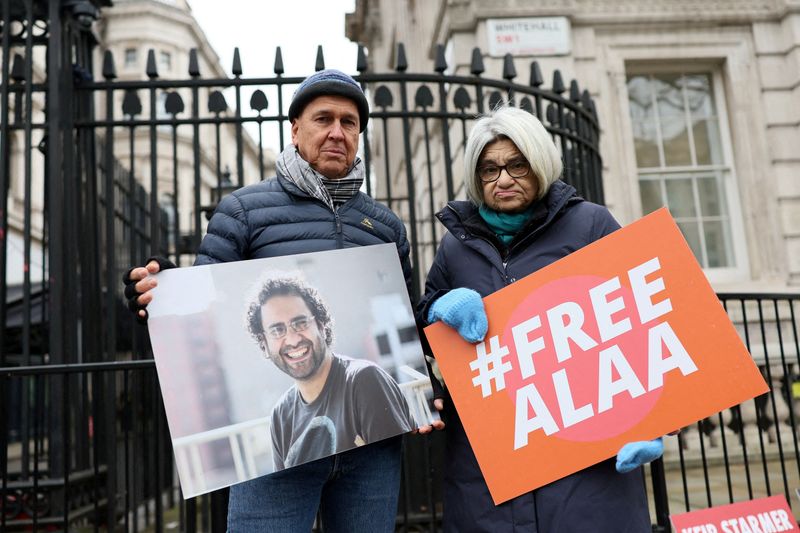By Aidan Lewis
CAIRO (Reuters) -Egyptian-British blogger and activist Alaa Abd el-Fattah rose to prominence as an impassioned voice in the Arab Spring uprising that toppled Egypt’s veteran autocrat and has since become a symbol of the struggle for human rights in his country.
On Tuesday, Egyptian President Abdel Fattah al-Sisi ordered authorities to study a possible pardon for Abd el-Fattah, along with seven others, the Egyptian National Council for Human Rights said in a statement.
A decision to release Abd el-Fattah could come within “a few days”, Tarek al-Awady, a member of Egypt’s presidential pardons committee, told Reuters.
Repeated family campaigns and pressure from the British government, including a plea from Prime Minister Keir Starmer to Sisi in February, have previously failed to secure his release.
Abd el-Fattah, 43, has spent much of the past decade in prison, most recently serving a five-year sentence that was imposed in December 2021 after he shared a social media post about a prisoner’s death.
His mother, Laila Soueif, said in a social media post earlier this month that he had started the latest in a series of hunger strikes on September 1 in protest against his detention.
Abd el-Fattah is a veteran democracy campaigner who first served spells in detention before the 2011 revolution that toppled President Hosni Mubarak and gave hope to a generation of activists in Egypt and beyond.
However, his fortunes darkened when former army chief Sisi ousted Mohamed Mursi of the Muslim Brotherhood in 2013 and a clampdown took hold after security forces killed hundreds of protesters. Islamists, leftists and liberals alike were swept up, with Sisi becoming president in 2014.
In a book of his writings, some smuggled out of his cell, Abd el-Fattah said he would never have guessed that “after a revolution that overthrew a tyrant, I’d return to his prisons.”
POLITICAL FAMILY
Abd el-Fattah grew up in a highly politicised, intellectual family. His mother, a former mathematics professor, is herself a seasoned campaigner and his father Ahmed Seif, who died in 2014, was a lawyer and left-wing activist jailed under both Mubarak and his predecessor as president, Anwar Sadat.
Abd el-Fattah became known for his blogs and social media accounts that gave voice to the Arab Spring protests in Tahrir Square. He also worked as a software developer, helping adapt open source programmes so that they were more accessible to Arabic speakers.
He was sentenced to five years in prison in 2015 for protesting without permission. Released on probation in 2019, he was reunited with his young son, but was required to sleep each night at a police station.
Detained again in September 2019, Abd el-Fattah was sentenced again to five years in December 2021 on charges of spreading fake news – a charge commonly levelled against critics of the government and activists who post on social media.
In Cairo’s notorious Tora prison he was kept in a cell without sunlight, deprived of books, news and exercise, and suffered abuse from prison guards, his family said, after conviction in a trial they said was unfair.
“My conditions are but a drop in a dark sea of injustice,” he said in November 2019 in a statement to the prosecutor, published in selected works in 2021 under the title, You Have Not Yet Been Defeated.
HUNGER STRIKE
Abd el-Fattah began a seven-month hunger strike on April 2, 2022, escalating his protest in November that year to coincide with the opening of COP27, a climate summit that put the global spotlight on Egypt. He only ended his protest after collapsing and coming close to death, his family said.
His lawyer, Khalid Ali, argued that his two years in pre-trial detention should be credited towards his sentence, making him eligible for release in 2024. But prosecutors resisted this, saying he should not be released till January 2027, Ali said.
This delay prompted his mother to go on hunger strike in late September 2024, only ending her protest in July 2025 after many appeals from her family and after losing over 35 kilograms.
Human rights groups say tens of thousands of prisoners of conscience have been detained under Sisi, often without due process, and that they have suffered a range of abuses including torture while in jail.
Sisi’s supporters say the crackdown on dissent and freedoms were needed to stabilize the state and that the government has promoted rights by working to provide basic needs such as jobs and housing.
In the face of foreign criticism, including over Abd el-Fattah’s conviction, officials say prisoners are detained and treated according to due legal process.
(Editing by Gareth Jones)

